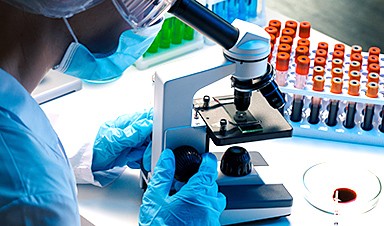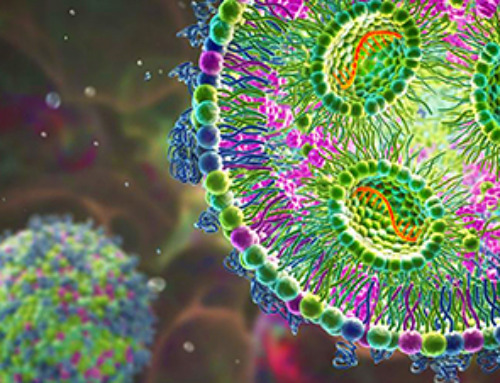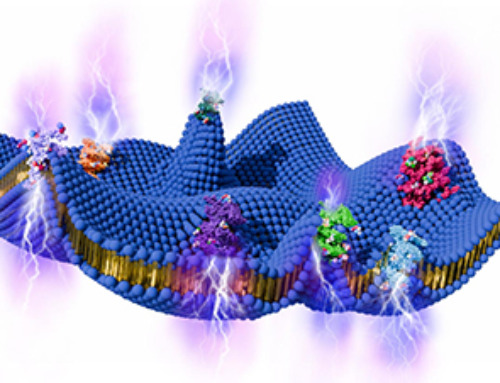A blood test for prostate cancer could spare thousands of men from unnecessary biopsies.
Experts say the breakthrough offers ‘great promise’ for detection of the disease, which is the most common cancer among men in the UK, affecting one in eight during their lifetime.
Men who visit their GP with symptoms receive a blood test called a PSA test, which can be inaccurate.
A new check was found to pick up 91 per cent of positive cases in 210 men with suspected prostate cancer.
It produced zero false positive results for men who do not have prostate cancer, so could spare thousands a painful biopsy or MRI scan which they may have been sent for based on a wrong PSA result.
The new liquid biopsy works by picking up tumour cells from prostate cancer in the blood.
A team including researchers from India and Imperial College London trialled it on men with signs of suspected cancer, like an enlarged prostate or urinary symptoms.
A third of these men were later found to have prostate cancer, while two-thirds had benign prostate conditions.
Among the 68 men with the cancer, the test was positive for 56 and gave a result which was less clear but unlikely to be negative for six of them.
It provided a negative result for all 142 men who did not have prostate cancer.
Simon Grieveson, of Prostate Cancer UK, said: ‘The detection of cancer cells in the blood has shown huge potential in recent years, and Prostate Cancer UK and Movember are jointly funding research into whether this could also help decide the best treatment for men with cancer still localised to the prostate.
‘These results show great promise and suggest that it may be possible to use this test to detect the cancer in the first place.’
The standard test used by the NHS looks for prostate-specific antigen – a type of protein from the prostate.
Last month a blood test combining the PSA check with one looking for changes in immune cells within the blood was found to be 93 per cent accurate for positive results when tested on 147 men.
Scientists are excited about a next generation of more accurate blood tests, which could perhaps be used to screen healthy men for early signs of cancer. The research was published in Cancer Medicine.
News
Nanomedicine in 2026: Experts Predict the Year Ahead
Progress in nanomedicine is almost as fast as the science is small. Over the last year, we've seen an abundance of headlines covering medical R&D at the nanoscale: polymer-coated nanoparticles targeting ovarian cancer, Albumin recruiting nanoparticles for [...]
Lipid nanoparticles could unlock access for millions of autoimmune patients
Capstan Therapeutics scientists demonstrate that lipid nanoparticles can engineer CAR T cells within the body without laboratory cell manufacturing and ex vivo expansion. The method using targeted lipid nanoparticles (tLNPs) is designed to deliver [...]
The Brain’s Strange Way of Computing Could Explain Consciousness
Consciousness may emerge not from code, but from the way living brains physically compute. Discussions about consciousness often stall between two deeply rooted viewpoints. One is computational functionalism, which holds that cognition can be [...]
First breathing ‘lung-on-chip’ developed using genetically identical cells
Researchers at the Francis Crick Institute and AlveoliX have developed the first human lung-on-chip model using stem cells taken from only one person. These chips simulate breathing motions and lung disease in an individual, [...]
Cell Membranes May Act Like Tiny Power Generators
Living cells may generate electricity through the natural motion of their membranes. These fast electrical signals could play a role in how cells communicate and sense their surroundings. Scientists have proposed a new theoretical [...]
This Viral RNA Structure Could Lead to a Universal Antiviral Drug
Researchers identify a shared RNA-protein interaction that could lead to broad-spectrum antiviral treatments for enteroviruses. A new study from the University of Maryland, Baltimore County (UMBC), published in Nature Communications, explains how enteroviruses begin reproducing [...]
New study suggests a way to rejuvenate the immune system
Stimulating the liver to produce some of the signals of the thymus can reverse age-related declines in T-cell populations and enhance response to vaccination. As people age, their immune system function declines. T cell [...]
Nerve Damage Can Disrupt Immunity Across the Entire Body
A single nerve injury can quietly reshape the immune system across the entire body. Preclinical research from McGill University suggests that nerve injuries may lead to long-lasting changes in the immune system, and these [...]
Fake Science Is Growing Faster Than Legitimate Research, New Study Warns
New research reveals organized networks linking paper mills, intermediaries, and compromised academic journals Organized scientific fraud is becoming increasingly common, ranging from fabricated research to the buying and selling of authorship and citations, according [...]
Scientists Unlock a New Way to Hear the Brain’s Hidden Language
Scientists can finally hear the brain’s quietest messages—unlocking the hidden code behind how neurons think, decide, and remember. Scientists have created a new protein that can capture the incoming chemical signals received by brain [...]
Does being infected or vaccinated first influence COVID-19 immunity?
A new study analyzing the immune response to COVID-19 in a Catalan cohort of health workers sheds light on an important question: does it matter whether a person was first infected or first vaccinated? [...]
We May Never Know if AI Is Conscious, Says Cambridge Philosopher
As claims about conscious AI grow louder, a Cambridge philosopher argues that we lack the evidence to know whether machines can truly be conscious, let alone morally significant. A philosopher at the University of [...]
AI Helped Scientists Stop a Virus With One Tiny Change
Using AI, researchers identified one tiny molecular interaction that viruses need to infect cells. Disrupting it stopped the virus before infection could begin. Washington State University scientists have uncovered a method to interfere with a key [...]
Deadly Hospital Fungus May Finally Have a Weakness
A deadly, drug-resistant hospital fungus may finally have a weakness—and scientists think they’ve found it. Researchers have identified a genetic process that could open the door to new treatments for a dangerous fungal infection [...]
Fever-Proof Bird Flu Variant Could Fuel the Next Pandemic
Bird flu viruses present a significant risk to humans because they can continue replicating at temperatures higher than a typical fever. Fever is one of the body’s main tools for slowing or stopping viral [...]
What could the future of nanoscience look like?
Society has a lot to thank for nanoscience. From improved health monitoring to reducing the size of electronics, scientists’ ability to delve deeper and better understand chemistry at the nanoscale has opened up numerous [...]





















